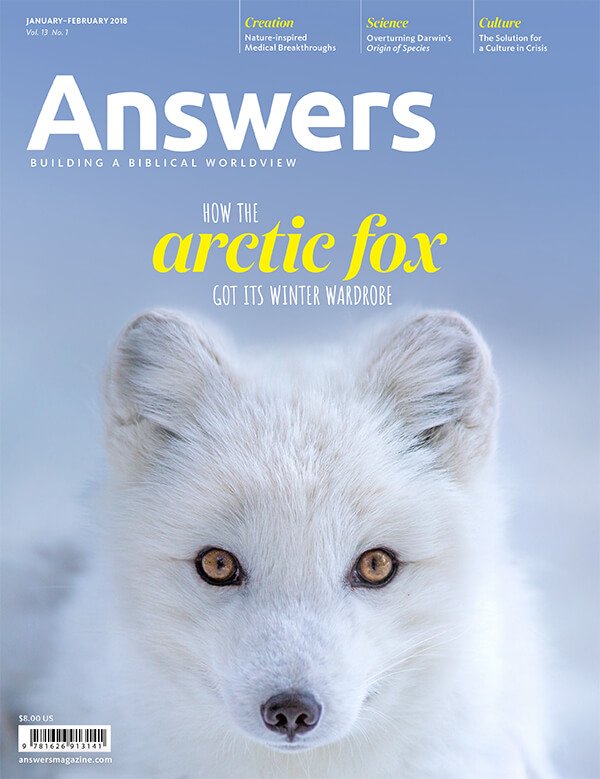
Smarter Than You Think
Astonishing examples of high intelligence in “lower” animals point to an all-knowing Creator.
Truman, an octopus at the New England Aquarium, could see several aquarium workers each day, but he consistently soaked only one college student volunteer with cold, salty water. After taking a leave for a few months, the volunteer returned and was promptly soaked again. Truman did not soak anyone else in the interim.1
In the past decade, octopuses have gained a reputation for high intelligence and acute awareness of their environment. They don’t just recognize human helpers, but they plan ahead. Many species will construct barriers around their homes to guard against potential predators or put coconut shells together to make temporary shelters. This behavior is considered tool use and is associated with “higher” thinking animals. Octopuses have been known to crawl out of aquarium tanks and find their way down drains to the ocean. Supposedly, one enterprising fellow crawled across a table and into another tank to grab a late-night snack of crabs while no one was watching and then returned to its tank.
Zookeepers and others who work with animals experience their smarts every day, but the rest of us miss out on these stories. We’re conditioned to assume “lower” animals aren’t smart. So stories like that about the octopus, an invertebrate, surprise us. For much of the last century, invertebrates were considered low on the scale of biological evolution and assumed to be much less intelligent than vertebrates like mammals.
British evolutionist Lloyd Morgan classically declared in 1894 that we should never assume advanced mental abilities if a lesser evolutionary cause will suffice: “In no case is an animal activity to be interpreted in terms of higher psychological processes if it can be fairly interpreted in terms of processes which stand lower in the scale of psychological evolution and development.” Basically, what Morgan is saying is that simple animals evolved before more complex animals and therefore simple animals will show little to no intelligence.
This thinking stifled decades of discovery in a branch of biology called ethology, the study of animal behavior. The idea that animals generally lack intelligence can be traced back to the pagan, humanistic philosophy of Aristotle, who put all living things on a scale “treating animals as simple minded.”2 Even Christians like Augustine were influenced by Aristotle’s man-centered (as opposed to Creator-centered) views.
Creationists have come up with a different view, based on the Bible, that leads us to expect astonishing examples of intelligence throughout the animal kingdom, not merely in “higher” forms, as proponents of evolution would expect. In his book Devotional Biology, Dr. Kurt Wise calls this “the spectrum of perfection.” If God is perfect and wants to reveal his attributes in an imperfect world, how can he do that? Dr. Wise suggests that he put in place a spectrum of intelligence which, when considered together, points to his perfect intelligence.
Thus, categories of intelligence are seen in God’s living creation down to the invertebrate level. Two of the four examples of “wise” animals that Solomon gives in Proverbs 30 are, for example, “lowly” invertebrates—ants and locusts! Only a wise Creator God, not unthinking haphazard evolution, could explain this widespread intelligence among such unrelated creatures.
Ants and locusts that live in large colonies do monumental work without an apparent leader. Scientific literature3 is beginning to catch up with what Scripture has said all along: the locust marches in ordered ranks without a king! The King of heaven designed them so we would wonder at the Creator who made this possible.
Many ethologists say social behavior is raw instinct, hardwired into animals after repeated interactions. They infer that ants are acting like automatons, so this is not the conscious thought associated with more advanced animals.
They used to say that abstract reasoning and self-awareness are limited to higher “developed” animals, and they developed a test to determine which animals have self-awareness. If animals recognize themselves in a mirror and do not attack their reflections or look behind the mirror, they pass. This mirror test was initially used to compare ape and human intelligence. But it is now known that at least a dozen animals pass, including dolphins, birds, elephants, and even a fish—the manta ray.
Birds? Magpies don’t even have a part of the brain that scientists thought was required for mirror recognition, but they pass the test with flying colors. One demanding aspect of the test is to recognize a colored spot experimenters put on the animal. The magpie dutifully scratches and attacks the spot on itself.
Perhaps more impressive is the lowly forager ant. When in front of the mirror, it moves its head from side to side and touches its reflection with its mouth. It also rubs its own face with antennae when a small blue dot is applied. Interestingly, some ape groups fail the same mirror test.
The list of examples goes on and on, not just of the types of creatures with special intelligence, but of the various types of smart behavior they display (see below).
High Intelligence in “Lower” Animals
God has given animals an array of math and language skills along with other abstract reasoning abilities. Who would have thought bats could remember debts or prairie dogs could describe colors?

Illustration by Wesley Merritt
- Ant: Counting
For an ant, finding the nest after a long day of foraging is a complex problem. Researchers suspected ants might count the steps to their nest, so they put tiny stilts on their legs to make their stride longer and found they then walked past their nest opening! - Chickadee: Communication
Chickadees, the popular little birds that visit our bird feeders in North America, can describe objects (for example, the size of a predator) and use syntax—the order of their chirps carries meaning, like words in a sentence. This was once considered a strictly human (not even ape) skill. - Prairie Dog: Communication
Prairie dogs use a complex series of chirps to tell each other a predator’s size, shape, color, and speed—even the color of hikers’ shirts near their nests. Of course, they also communicate whether that fanged brute lurking nearby is a fun-loving dog or a deadly coyote.4 - Scrub Jay: Theory of Mind
Jays and crows demonstrate something called theory of mind, which is the ability to think about what others are thinking. If a scrub jay sees another jay is watching it, it will fake burying a seed and then leave and bury it somewhere else.5 - Vampire Bat: Memory
Vampire bats cannot go long without a blood meal, so they sometimes share with each other. But they pay their debts. They also remember bats who do not pay back. Some will even refuse deadbeat relatives and feed strangers instead. This shows memory skills and thought processes. - Crow: Memory
Memory is another attribute of supposedly “higher” animals. Jays and crows can remember as well as or better than apes—and even humans in some cases! They remember hundreds of places they bury seeds each day and recover them days later.
Although God placed marvelous examples of intelligence in his creation, even among his small and lowly creatures, none can compare to the full range of abilities given to his human creation, the only creature given the wisdom to have loving dominion over all God’s earthly creation. An evolutionary psychologist wrote a book recently to document the similarities and differences between humans and apes. He eloquently described this uncrossable gap. Perhaps unintentionally, he also recognized the serious obligation that our unique intelligence places on us.
We wield unheralded power—power to shape the future and power to destroy and annihilate. . . . Our powers are used for good as they are for bad, and we incessantly debate which is which. Our minds have spawned civilizations and technologies that have changed the face of the earth, while our closest living animal relatives sit unobtrusively in their remaining forests.6
Solomon lists two other animals that are wise: the rock badger and lizard. They both find and make their homes in the security of rocks and palaces. Surely this is the most intelligent decision we can make, to seek rest and security in the safest place in the universe. The all-wise God, who made us in his image, has given us the ability to understand our need for a safe, eternal home, and he has shown us in his Word how to get there.
Jesus Christ, the Creator of the universe, filled the earth with a spectrum of intelligent beings to point our eyes to him, from the lowly ant underground to land animals and fish to the birds of the air. He wants every creature to give him glory, most of all the ones Christ died for and for whom he is now building an eternal home in heaven where they can live securely forever.
Answers Magazine
January–February 2018
When winter arrives, this fox puts on his new wardrobe just for the ocassion.
Browse IssueFootnotes
- Sy Montgomery, The Soul of an Octopus: A Surprising Exploration into the Wonder of Consciousness (New York: Atria Books, 2015).
- Inside Animal Minds, National Geographic special publication, 2017.
- Deborah M. Gordon, “The Collective Wisdom of Ants,” Scientific American 314, no. 2 (February 1, 2016): 44–47, https://www.scientificamerican.com/article/the-collective-wisdom-of-ants/.
- Inside Animal Minds, National Geographic special publication, 2017.
- Belinda Recio, Inside Animal Hearts and Minds (New York: Skyhorse Publishing, 2017).
- Thomas Suddendorf, The Gap (New York: Basic Books, 2013).
Recommended Resources

Answers in Genesis is an apologetics ministry, dedicated to helping Christians defend their faith and proclaim the good news of Jesus Christ.
- Customer Service 800.778.3390
- Available Monday–Friday | 9 AM–5 PM ET
- © 2026 Answers in Genesis



